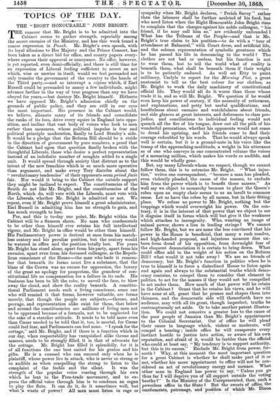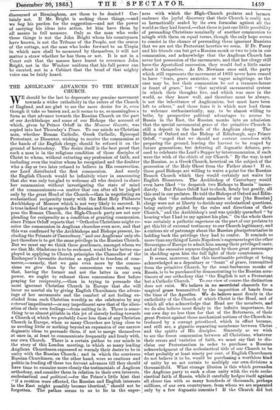TOPICS OF THE DAY.
THE " RIGHT HONOURABLE " JOHN BRIGHT.
TBErumour that Mr. Bright is to be admitted. into the Cabinet seems to gather strength, especially among the secret enemies of the Ministry, and has this week found a coarse expression in Punch. Mr. Bright's own speech, with its loyal allusions to Her Majesty and the Prince Consort, has been taken as a direct bid for office, and county papers every- where express their approval or annoyance. No offer, however, is yet reported, even demi-officially, and there is still time for an expression of Liberal feeling sufficient to arrest an act which, wise or unwise in itself, would we feel persuaded not only transfer the government of the country to the hands of the Third party,—and so interrupt a regime which, if Earl Russell could be persuaded to annoy a few individuals, might advance farther in the way of true progress than any we have obeyed for years,—but destroy Mr. Bright himself. Hitherto we have opposed Mr. Bright's admission chiefly on the grounds of public policy, and they are still in our eyes the most important. His presence in the Cabinet would, we believe, alienate many of its friends and consolidate the ranks of its foes, drive every squire in England into oppo- sition, and incline that vast body of voters who look to men rather than measures, whose political impulse is fear and political principle moderation, finally to Lord Stanley's side. It would be a pledge that the Reform Bill should be a stride in the direction of government by pure numbers, a proof that the Cabinet had upon that question finally broken with the thoughtful Liberals, those who desire a perfect representation instead of an indefinite number of noughts added to a single unit. It would spread through society that distrust as to the intent of the new franchise which is so much more operative than argument, and make every Tory diatribe about the " revolutionary tendencies" of their opponents seem primci facie fair. Nor would it bring to the Cabinet the outside support they might be inclined to expect. The constituencies of the South do not like Mr. Bright, and the constituencies of the North, which do, will vote with the Liberals, must vote with the Liberals, whether Mr. Bright is admitted or not. We repeat, even if Mr. Bright prove himself a great administrator, Earl Russell in admitting him has no strength to gain, and has much strength to lose.
For, and this is to-day our point, Mr. Bright within the Cabinet will be a Samson shorn. No man who condescends to be other than himself ever retains his full intellectual vigour, and Mr. Bright in office would be other than himself. His Parliamentary power is derived at once from his match- less oratory and his peculiar position, but the oratory would be watered in office and the position totally lost. For years Mr. Bright has stood alone, apart from his party, apart from his enemies, apart even from his deceased colleague, as the Repub- lican conscience of the House—the man who bade it remem- ber that beneath its forms must live a substance, that the blaze of the Crown was no excuse for oppression, the luxury of the great no apology for pauperism, the grandeur of con- stitutional life no compensation for a failure in its ends. His business has been to lift the robe, to unveil the face, to blow away the cloud, and show the reality beneath. A constitu- tional Parliament needs such a living conscience, some one who will remind it that forma, liewi!iver valuable, are forms merely, that though the people are subjects,—throne, and peerage, and representation alike exist for them, that below and around the constituencies are millions of living men not to be oppressed because of a formula, not to be neglected for the sake of a statelier attitude. It needs to be told more even than Caesar needed to be told that it, too, is mortal, for Caesar could feel fear, and Parliaments can feel none. "I speak for the cottage," said Mr. Bright, and if there is a function which in our day, when respectability has vanquished alike throne and masses, needs to be strongly filled, it is that of advocate for the cottage. Mr. Bright has filled it splendidly, for it is of all functions the one best suited for his genius and his gifts. He is a counsel who can succeed only when he is plaintiff, whose power lies in attack, who is never so strong or so audible as when compelling the strong to listen to the complaint of the feeble and the silent. It was the strength of the popular voice roaring through his own which he lent to the Free-trade movement, and to ex- press the official voice through him is to condemn an organ to play the flute. It can do it, do it sometimes well,- but what 'a waste of power! "'All men must listen in rage or sympathy when Mr. Bright declares, " Perish Savoy rather than the labourer shall be further mulcted of his food, but who need listen when the Right Honourable John Bright rises to complain that the charges against his noble colleague, " his friend, if he may call him so," are evidently unfounded What has the Tribune of, the People—and that is Mr_ Bright's true claim to his position—to do with a " tour of attendance at Balmoral," with Court dress, and artificial life, and the solemn representation of symbolic greatness which he has passed his life in denouncing to the world ? The clothes are, not bad or useless, but his function is not to wear them, but to tell the world what of reality is beneath them, what shall be beneath them if their weight is to be patiently endured. As well set Etty to paint millinery, Carlyle to report for the Morning Post, a great anatomist to tell us the best colour for our clothes, as Mr. Bright to work the daily machinery of constitutional official life. They would all do it worse than those whose trade it is, and so will Mr. Bright. We question if he would even keep his power of oratory, if the necessity of reticences, and explanations, and petty but useful qualifications, and heedfulness about enemies and watchfulness about friends, and side glances at great interests, and deferences to class pre judice, and conciliations to individual feeling would not. quench all the fire of his tongue, draw out all the pith of his wonderful perorations, whether his opponents would not cease to dread his uprising, and his friends cease to find their courage redoubled by his words. That he would always speak well is certain, but it is a ground-note in his voice like the tramp of the approaching multitude, a weight in his utterance as of one who conveys in one concentrated volume the voices of a menacing million, which makes his words so audible, and this would be wholly gone.
But, say many Liberals whom we respect, though we cannot follow them, this is to ostracize Mr. Bright. " What injus- tice," writes one correspondent, "because a man has pleaded, even violently pleaded, the cause of the masses, to exclude him from the power which is to benefit those masses." As well say we object to monarchy because to place the Queen's robes upon an empty chair seems to us an insult to common sense. Let us have the robes by all means, but in their fitting- place. We refuse no power to Mr. Bright, nothing but the trappings which would overweight his power. On the con- trary, it is in the interest of that power that we object to see it disguise itself in forms which will but give it the weakness which attaches to incongruity. Who, wanting an image of animal power, shows a lion in leading strings ? We cannot follow Mr. Bright, but we are none the less convinced that his power in the House is beneficial, that many a rash resolve, and high-handed proposal, and injurious measure dies un- born from dread of his opposition, from downright fear of the eloquent denunciation it is certain to bring down. What could office add to the weight of his action on the Reform Bill ? what would it not take away? We are no friends of democracy, but Mr. Bright's function in politics when he is true to himself is to force a disinclined House to listen again and again and always to the substantial truths which demo- cracy contains, to compel them to consider that element in politics, to act for the masses if they would not be compelled to act under them. How much of that power will he retain in the Cabinet ? Grant that he retains his views, and he will have none at all grant that he prunes and shapes them into thinness, and the democratic side will thenceforth have no audience, may with all its great, though imperfect, truths be contemptuously set aside. Or to take another patent illustra- tion. We could not conceive a greater loss to the cause of the poor people of Jamaica than Mr. Bright's appointment to the Colonial Secretariat. Out of office he will plead their cause in language which, violent or moderate, will compel a hearing ; inside office he will exasperate every instinct hostile to justice into action, or aware of his own reputation, and afraid of it, would be feebler than the official who could at least say, "My tendency is to support authority, but this is its excess." Exclude Mr. Bright from power, for- sooth ? Why, at this moment the most important question for a great Cabinet is whether he shall make part of it or not; whether his mere appointment to office will not be con- sidered an act of revolutionary energy and menace. What other man in England has power to say, "Unless you go thus far I will deprive you of all support outside the voting booths ?" Is the Ministry of the Unrepresented, then, such powerless office in the State ? But the sweets of office, the emoluments, patronage, and position of which Mr. Dixon
discoursed at Birmingham, are these to be denied Cer- tainly not. If Mr. Bright is seeking these things,—and we beg his pardon for the suggestion—and not the power of carrying his ideas into action, let him have them by all means in full measure. Only as the man who seeks these things is not the John Bright whom his countrymen have known, is not the Tribune of the People, not the orator of the cottage, not the man who looks forward to an Utopia in which men shall be measured by themselves, it will not matter a straw whether he has them or not. It is not in a Court suit that the masses have learnt to reverence John Bright, not in the Windsor uniform that his full power can be exerted, not in a Cabinet that the brool of that mighty voice can be fairly heard.































 Previous page
Previous page